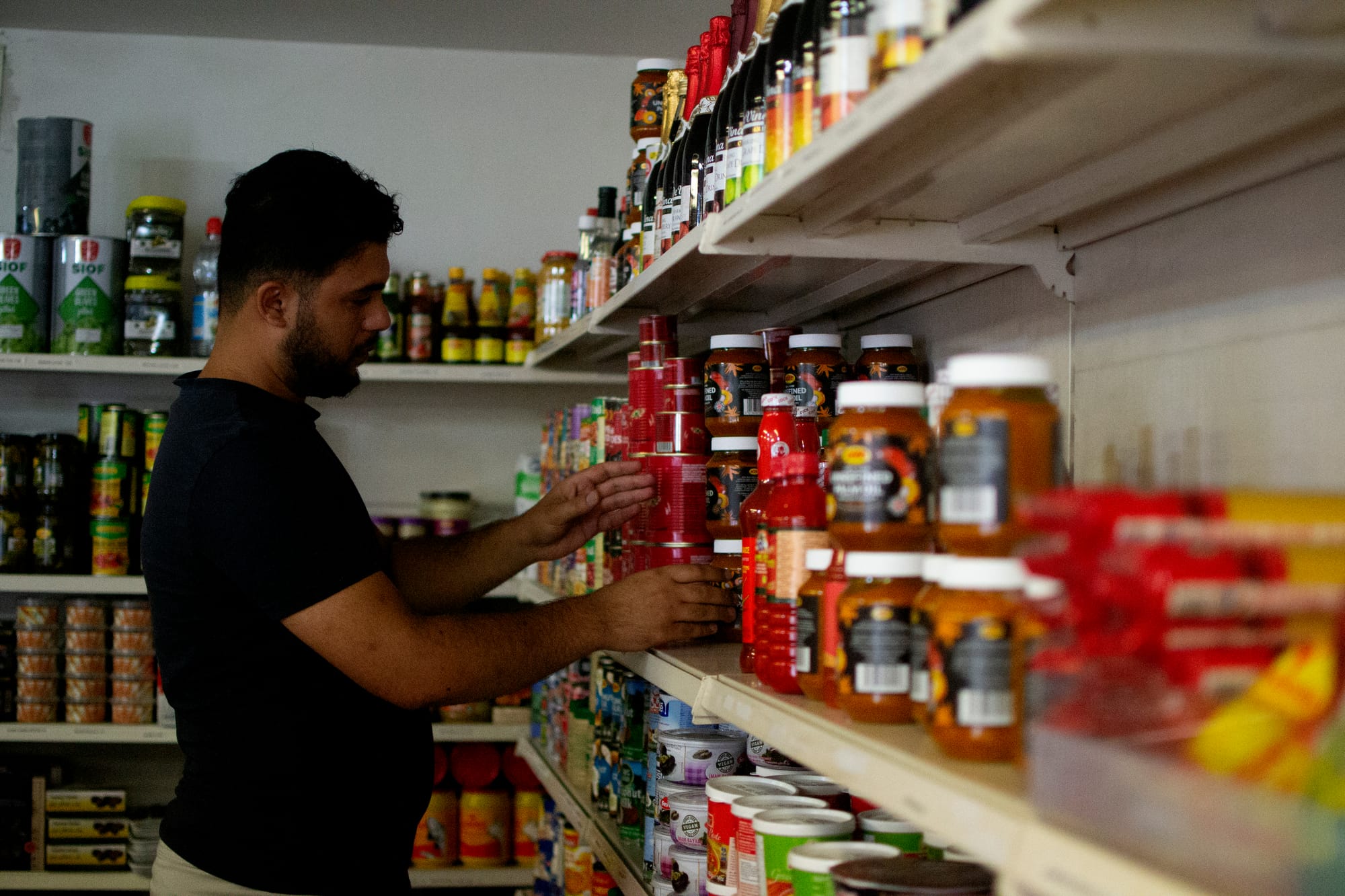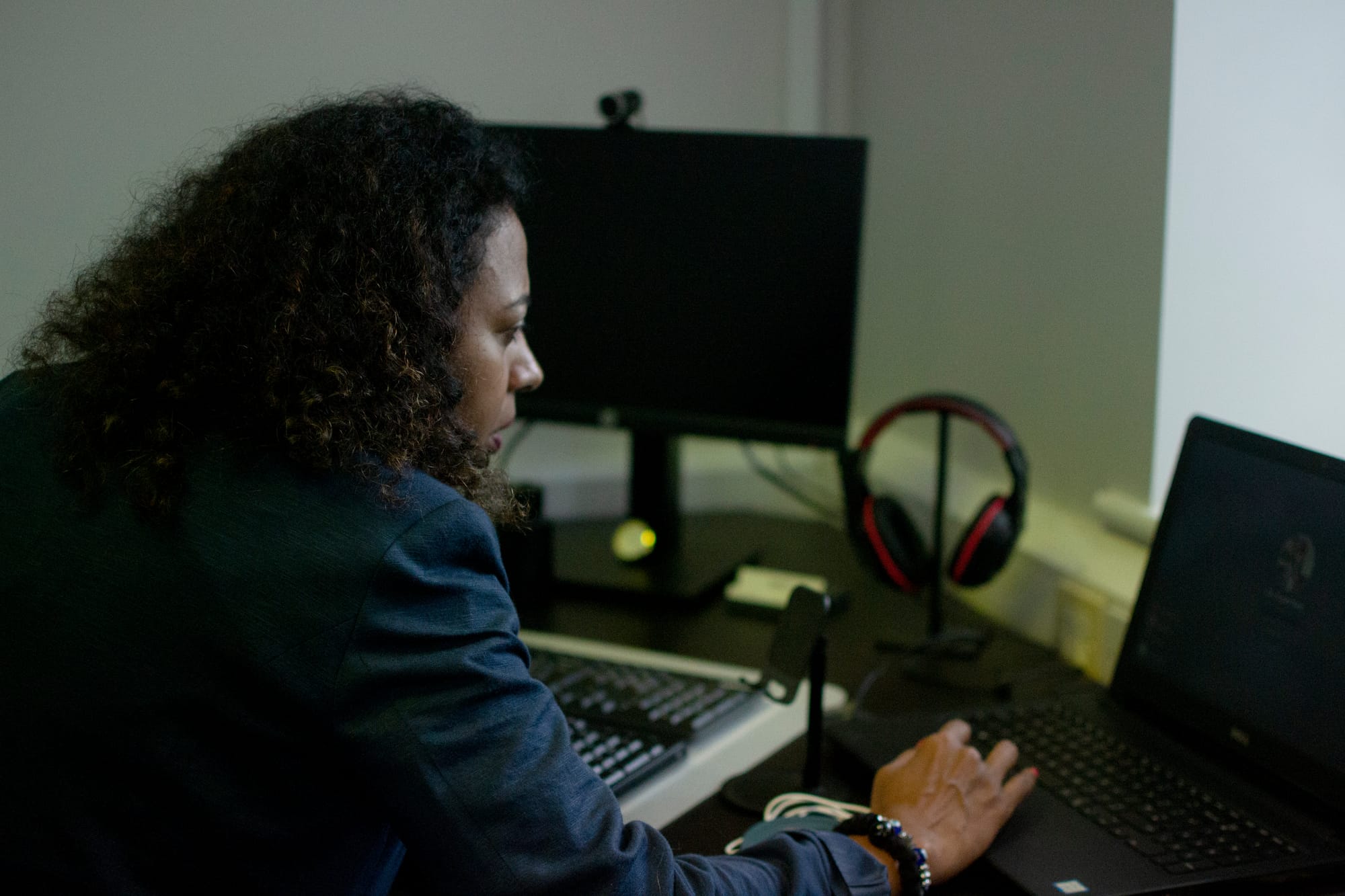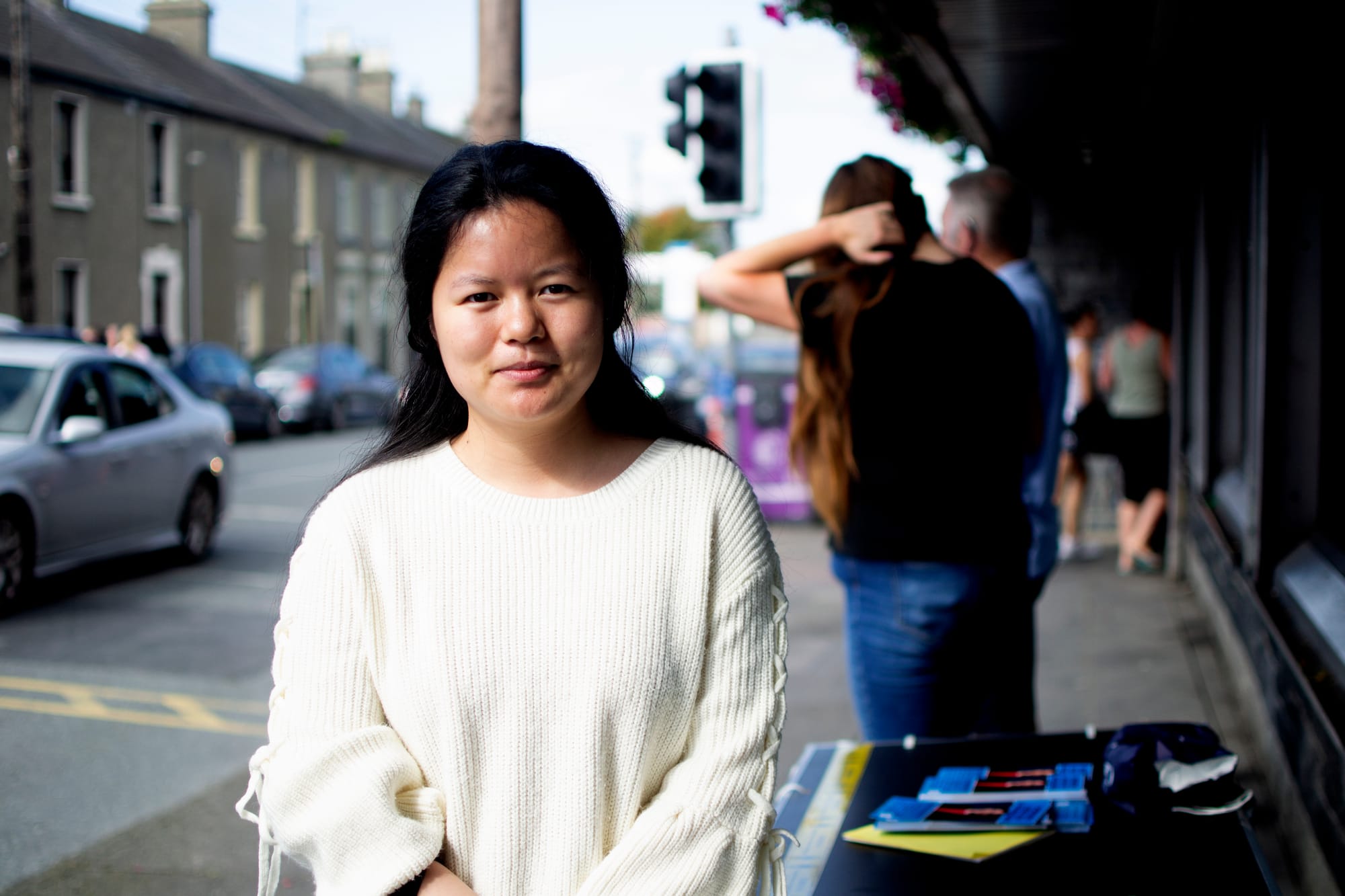What’s the best way to tell area residents about plans for a new asylum shelter nearby?
The government should tell communities directly about plans for new asylum shelters, some activists and politicians say.
They’re either unaware they can, or so busy grappling with challenges of immigrant life that they don’t have the bandwidth to get involved in local democracy.

Ahmad Shah Ahmadi pauses, midway through stacking cans of tomato paste onto a shelf at the Pricewise Supermarket.
No, he isn’t eligible to vote, he says. “I don’t have the status.” He shakes his head with a smile.
Once he learnt that even though he isn’t an Irish citizen, as a resident he has the right to vote in local elections – like the upcoming one in mid-2024 – Ahmadi said that it makes him feel accepted as part of the community in Fingal.
“It’s like, it gives you a sense of integrity,” said Ahmadi.
Several people last Saturday in Balbriggan said that they weren’t aware of their voting rights. Others had another reason for staying away from voting centres on election days.
Outside Brownes Butchers on Bridge Street, Hasan Bahadori, whose face was glistening with sweat, said he knew he could vote but he is often too exhausted and overwhelmed with work to remember. “I’m a busy man,” he said, grinning.
For a few months, talking points with conspiratorial undertones have been circulating around anti-immigration social-media channels, opposing the right of immigrants and asylum seekers to vote in local elections and spreading fear about their participation in those next year.
But this extremist narrative that rejects the idea that migrants should have a vote come election time – and through that a voice in their local communities – also ignores the reality of voter patterns in past elections and that immigrants have in fact been underrepresented at the ballot box.
During the 2019 local elections, only 1 in 10 registered non-EU residents turned up to vote in Dublin, suggests ongoing research by William Durkan, a lecturer at University College Cork’s geography department and Adrian Kavanagh, a geography lecturer at Maynooth University.
Durkan, who studied migrants’ voting patterns during the 2019 local election as part of his PhD research, pointed to reasons for that, which people in Balbriggan independently raised later during Saturday’s vox pops.

Immigrants are either unaware of their voting rights or so busy grappling with challenges of immigrant life that they are left with little bandwidth to get involved in local democracy.
“The more upheaval or disruption they have in their life, the less likely they are to go and get engaged,” said Durkan by phone on Friday. Challenges like housing instability can dampen participation, he said.
In Fingal in the 2019 local elections, voter turnout among both non-EU and European residents varied massively by area.
The highest turnout among non-EU and European registered voters was a little over 41 percent recorded in the Hollywood electoral division, shows Durkan’s PhD research. The lowest rate was about 7 percent in Turnapin, it says.
“There is a broad geographical trend in which the highest values tend to be located along the coast in the more middle-class areas,” the study says.
In general, voter turnout is higher in areas where people own their homes and employment rates are high, said Durkan.
“You’d tend to see lower turnout in areas where there’s a high level of rented accommodation, high levels of unemployment and high levels of residential mobility,” said Durkan.
Migrants are more likely to be in the private-rental sector than people who were born here and more likely to be pushed into homeless shelters or live in overcrowded accommodation, says an April 2022 report by the Economic and Social Research Institute.
As the number of Ukrainian refugees and asylum seekers from elsewhere grew, the government increased its use of emergency accommodation with poorer standards, and people are spending longer in those settings.
Durkan says feeling transient can impact people’s motivation to vote.
“If you’re more of a transient resident, you don’t necessarily have the connection to the area in a lot of cases, not always, but in a lot of cases,” said Durkan.

On Thursday, Punam Rane, a Fine Gael councillor who represents Blanchardstown-Mulhuddart, said that when she knocks on doors in her area, migrants do mention housing instability as one reason why they aren’t motivated to vote.
“If they’re renting, they say, ‘After a year or something I will be renting somewhere else, so why bother?’” said Rane, sitting behind a rectangular desk in her office above the Rendezvous café on Main Street in Ongar village.
Rane got a pamphlet with information in a few different tongues on how to register to vote from her party and printed some out for when she goes out on registration drives, she says.
Some people delight at the sight of their first language on the brochure, Rane says, and tell her they’d register. “We’ll see in the next elections.”
Rane, who was born in India, joined Fine Gael in 2017, she says. The party’s values aligned with hers and she especially liked its leader, Taoiseach Leo Varadkar, said Rane.
She stood for election in 2019 for the first time and won. “And the rest is history,” she said, smiling.
Only nine people with immigrant backgrounds sat in local councils across the country after the 2019 election and a few more were co-opted later. There are 949 council seats in Ireland.
Rane says more migrants standing for election might encourage more migrants to vote.
But Durkan’s study suggests that there isn’t a meaningful relationship between the two.
Even when considering a variable like the presence of migrant candidates, said Durkan, it’s symptoms of deprivation like housing insecurity and unemployment that dictate people’s levels of engagement.
If a migrant stands for election in an affluent electoral area, he said, more affluent migrants living there would likely vote for them because they would be more inclined to vote anyway.
“So it follows along the same trends,” he said.
On Saturday, Hassan Shaikh, who was strolling along Balbriggan’s Bridge Street clutching his little boy’s hand, said a candidate’s minority status doesn’t impact his decision to vote.
Shaikh – who was also unaware of his right to vote in local elections – said if he was going to vote, he’d go by whoever seems like a better candidate to address the local issues that give his family the most grief.
Some teenagers in the area had hit his son in the head and shouted racist slurs at him recently, said Shaikh, gesturing at the kid who was glancing at a small toy in his free hand.
“Even if I call the guards, nothing will happen because they are under 18,” he said.
Shaikh said he would vote for someone offering an alternative solution for tackling racist anti-social behaviour like that.
Candidates’ immigrant roots make him feel proud, though, he said, the way he’s proud of Varadkar’s connection to India. “But it doesn’t really matter, no.”
Meanwhile, Bahadori – who was outside the butchers – said he repairs electric appliances and works six days a week and most of his time is spent on the road, trying to reach customers sharpish.
He would like to see traffic light sequences updated so they allow cars through more smoothly, he said, and if he had the headspace to consider voting and looking up candidates, he would vote for people who cared about that.
“If they just looked at this issue, that would be very helpful,” said Bahadori.
Durkan says more migrants running can still make a difference.
It can help make more immigrants aware of their right to vote because they might have better access to networks of people in their communities, he said. “It’s not something that’s been largely state-driven or state-supported.”
A spokesperson for Fingal County Council said it has developed a local government education and mentoring programme for women and minorities interested in running as candidates.
The Immigrant Council of Ireland also offers a migrant political participation training course.
Fernanda Otero, who was born in Brazil, took part in that. She was paired with Lorraine Hall, a Fianna Fáil councillor for Dún Laoghaire-Rathdown, so she could learn more about what it means to sit at the local council.
At first, she was worried she wouldn’t get along with Hall, says Otero. Otero used to be a member of People before Profit. “I’m a leftist woman.”
But it worked out well in the end, Otero says. “I was happy to see how she was open to my ideas,” said Otero, who is considering running as an independent next year.
Otero says she sees many missed opportunities for informing immigrants about their voting rights.
English language schools, for example, have a golden chance to tell their students that they can vote in local elections and talk about that in classes, she said. “Unfortunately, there’s no policy like that.”
A spokesperson for Fingal County Council said that its migrant integration and social cohesion strategy includes activities to raise awareness about voter registration.
The council offers workshops for understanding local government in Fingal too, targeting hard-to-reach communities, they said.
Online though, there are signs of efforts to whip up fear about immigrants voting and to push back against their right to have a vote on who represents the communities that they live in.
The conspiratorial rhetoric copies that of anti-immigrant movements in other countries around election time, arguing that White people are being gradually replaced with migrants of colour.
“It’s a kind of version of the Great Replacement conspiracy theory, that migrants are being imported to be used as voting blocks to keep parties in power,” says Aoife Gallagher, a senior analyst at the Institute For Strategic Dialogue (ISD), a global non-profit focused on offering solutions for tackling hate, misinformation and extremism.
French author Renaud Camus first floated the Great Replacement conspiracy theory in a book by the same name in 2012. It gradually carried from one language to another and has been embraced by extremist groups in other Western countries.
In the context of elections, Gallagher says, it’s widely used across the Atlantic. Tucker Carlson, the former Fox News chat-show host, helped popularise it a ton, she says. “It’s extremely popular in the US.”
Extremist groups in Ireland, she says, also attempt to spread untruths about the extent of immigrants’ voting rights and try to make it look like they can vote in general elections too.
Teresa Buczkowska, who helped run the Immigrant Council’s migrant participation training course, says she worries these fallacies will make voting stations unsafe.
Gardaí shouldn’t allow anti-immigrant protests to form outside voting stations, she said. “I would consider this to be illegal if they’re protesting outside a voting station.”
A spokesperson for An Garda Síochána said it can’t comment on speculation about whether a group might get involved in a potential activity.
The right to vote is set out in legislation, they said, and there are restrictions on “obstruction or interference with electors”.
But they said there is a constitutional right to freedom of assembly.
“An Garda Síochána respects the right of citizens to exercise their constitutional rights and to carry out peaceful protest,” the spokesperson said.
People don’t need permission from the Gardaí to hold public gatherings, they said.
But Gardaí has appropriate policing plans to patrol and monitor all polling stations to uphold the integrity of the democratic process, the spokesperson said.
On Saturday’s summery morning in Balbriggan, Sinn Féin politician Louise O’Reilly TD handed out leaflets to passersby.
She gave one to Xinyi Fei, who was also unaware of her right to vote in local elections. “I like to gather more information about it now,” she said later, glancing at O’Reilly’s leaflet.

O’Reilly said local elections are about the Dublin neighbourhoods that all Dubliners share and care about, and coming up with ways to improve them.
“It’s about the quality of the drinking water, it’s about infrastructure, where you send your kid to school, it’s about where you can cycle safely,” she said.
O’Reilly said she was hopeful that the opposition to migrants’ participation inspires something positive, galvanising different groups to work harder to inform immigrants about their right to vote.
“Oh God, I hope,” she said, shaking the leaflets in her hands.
Back in Pricewise Supermarket, Ahmadi said he was happy to learn that he was allowed a say in the upcoming local elections – even if life gets in the way and he forgets to vote.
“It’s good to hear,” he said. “It gives you a purpose.”